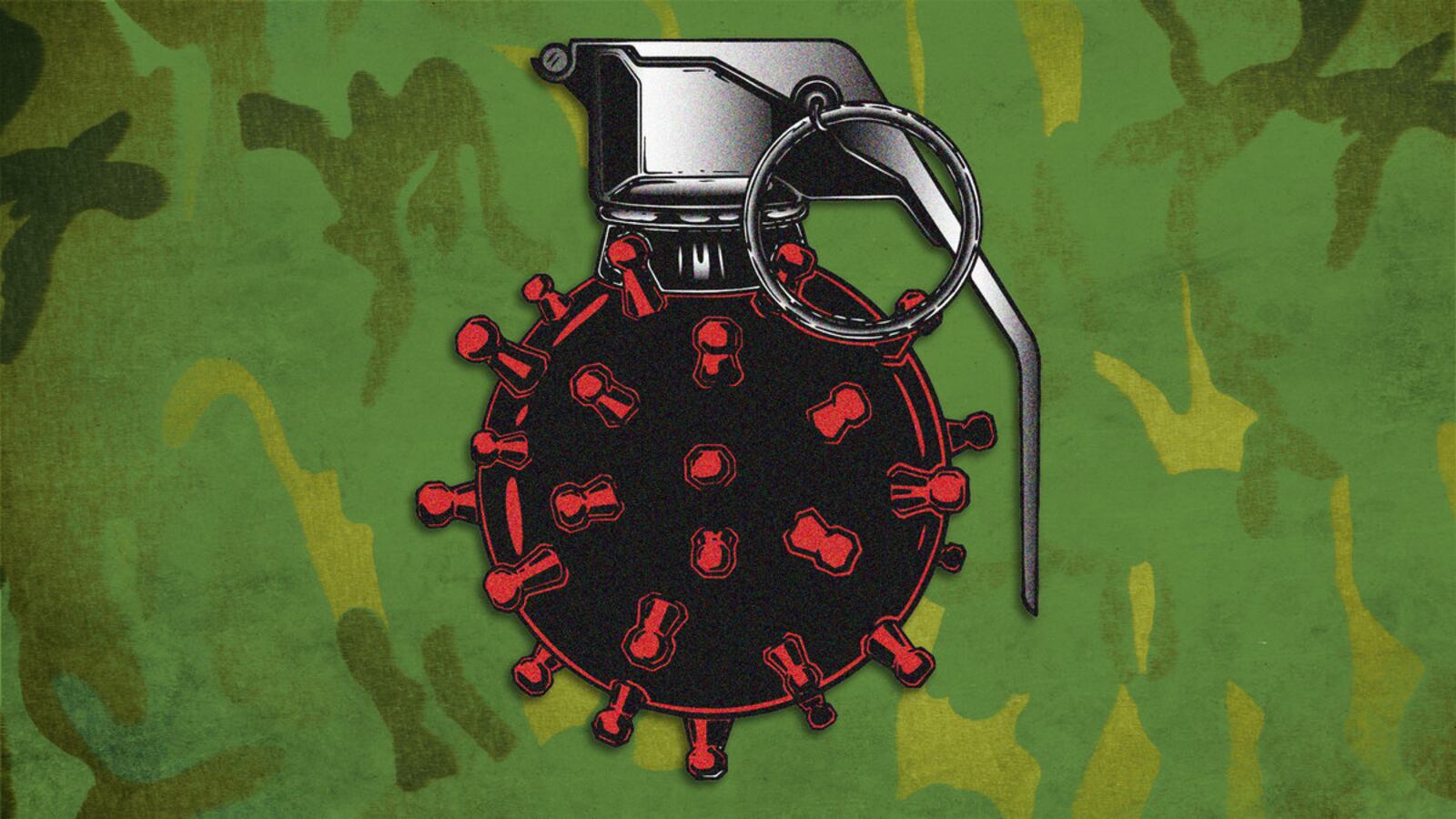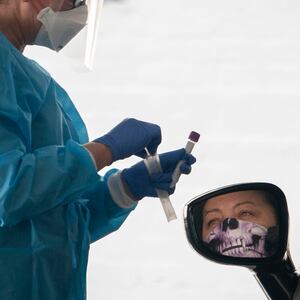The U.S. Army has declared war on the novel coronavirus—and civilian scientists are grateful for the reinforcement.
The ground combat branch’s Medical Research and Development Command at Fort Detrick in Maryland has been working on a range of tests and therapies as well as possible vaccines, the command’s top officer told reporters last week.
“Our researchers and scientists are using all of our assets to develop countermeasures to detect, treat and defeat the virus,” Brig. Gen. Mike Talley said.
Those assets are considerable. Not only does the Army oversee several high-tech labs, it also has access to the Defense Department’s extensive hospital infrastructure as well as health resources in foreign countries. In 2009, the Army famously organized, in Thailand, the only large-scale trial of an HIV vaccine that demonstrated any effectiveness. That effort involved 16,000 volunteers at 55 sites across Thailand.
“When thinking about doing large-scale testing and deployment across the nation rapidly, the deep logistical expertise of the military is a huge advantage,” Dave O’Connor, a professor of pathology and laboratory medicine at the University of Wisconsin-Madison, told The Daily Beast.
The Army’s $100-million coronavirus campaign piles onto many of the most promising therapies that civilian scientists are already working on. The service is investigating several drugs for treating COVID-19, the disease that can result from a SARS-CoV-2 infection. It’s also experimenting with convalescent plasma and monoclonal antibodies.
Some of the Army efforts are more unique to the service. It’s developing a wearable device to detect COVID-19 symptoms while also certifying its helicopters to safely transport people infected with the virus.
The service’s work on vaccines might have the most potential to make a lot of difference. Of the world’s roughly 70 major coronavirus vaccine candidates, the Trump administration has tapped five for major support as part of the federal government’s $10-billion Operation Warp Speed. These are the vaccine candidates from Merck, Pfizer, AstraZeneca, Johnson & Johnson and Moderna.
The Army is trying to contribute to work on the AstraZeneca, Johnson & Johnson and Moderna candidates as well as a potential vaccine from Sanofi Pasteur. “We’re heavily engaged in discussions at every level of testing about how we can be involved in those efforts,” Nelson Michael, the director of the Army’s Center for Infectious Disease Research, which is part of Talley’s command, told reporters.
But Moderna’s vaccine is the Army’s main target. The Massachusetts-based pharmaceutical firm could begin phase-three trials of its vaccine candidate as early as July, Anthony Fauci, the director of the National Institute of Allergy and Infectious Diseases, announced on Wednesday.
“Moderna is very, very likely to be the first major vaccine to be tested on a large scale,” Michael said. And those phase-three trials probably will take place mostly in the United States. That makes it a strong candidate for big Army support, Michael explained.
The service can lend its labs and scientists to help speed the trials along. “It is reasonable to expect that there will be some form of a vaccine that could be available at some level to a certain population by the end of the year,” said Col. Wendy Sammons-Jackson, director of the Military Infectious Disease Research Program, also at Fort Detrick.
The Army is also developing its own vaccine as a sort of back-up to the vaccine candidate from private companies. Kayvon Modjarrad, the director of the emerging infectious diseases program at the Walter Reed Army Institute of Research—yet another of Talley’s commands—called the Army vaccine candidate as a “long-term approach.”
The idea is to craft a basic vaccine that works on a wide range of different coronaviruses, including any new versions of SARS-CoV-2. “In the event the virus mutates, our vaccine is in a position to cover [these] new strains or mutations,” Modjarrad said on Tuesday.
David Morrison, a biologist at Uppsala University in Sweden, in general had good things to say about working with military researchers. But the Army’s specific plan for a broad coronavirus vaccine is a risky one, he added. “A generally applicable vaccine seems like a very big challenge.”
Work on that back-up vaccine is ramping up, regardless. “We have been vaccinating hundreds and hundreds of mice with different versions of our vaccine,” Modjarrad said. “We will be making a decision as to which one is the best one that we will be taking forward for manufacturing next week.”
If there’s a downside to the Army’s involvement in coronavirus research, it’s that the service works best in and with countries that are U.S. allies. The pathogen, however, doesn’t care about geopolitics. Stopping a global pandemic requires a truly global effort—something the Army might not be fully capable of embracing.
“It would be a shame if the military was, for political or other reasons, unable to participate fully in these global conversations,” O’Connor said, “and openly share their results in the same spirit as so many others.”







